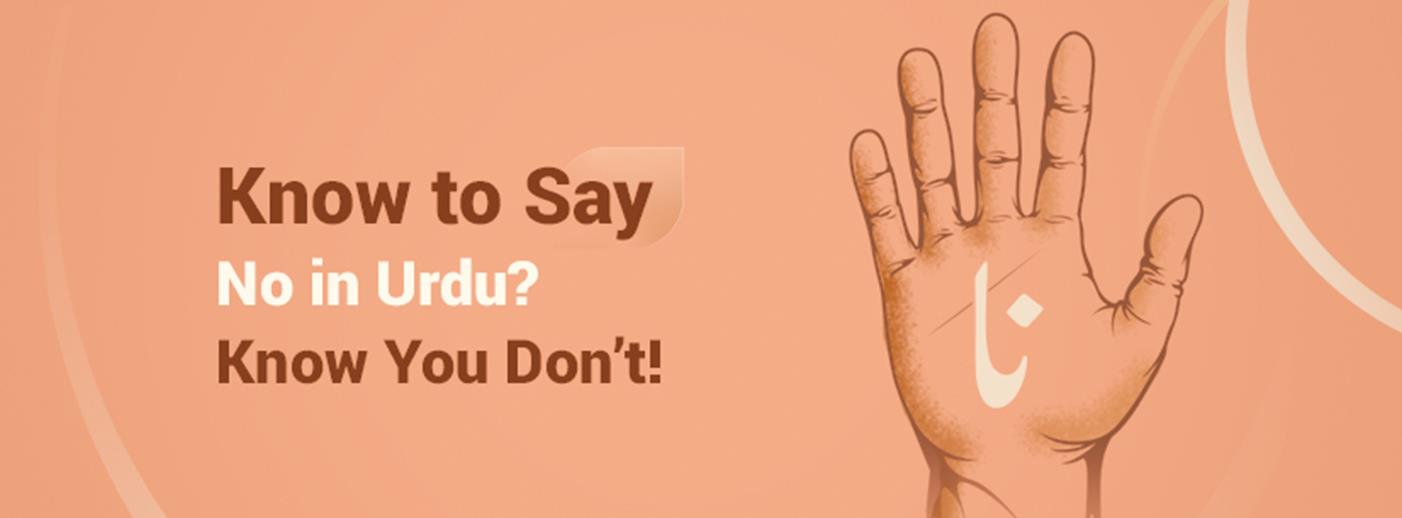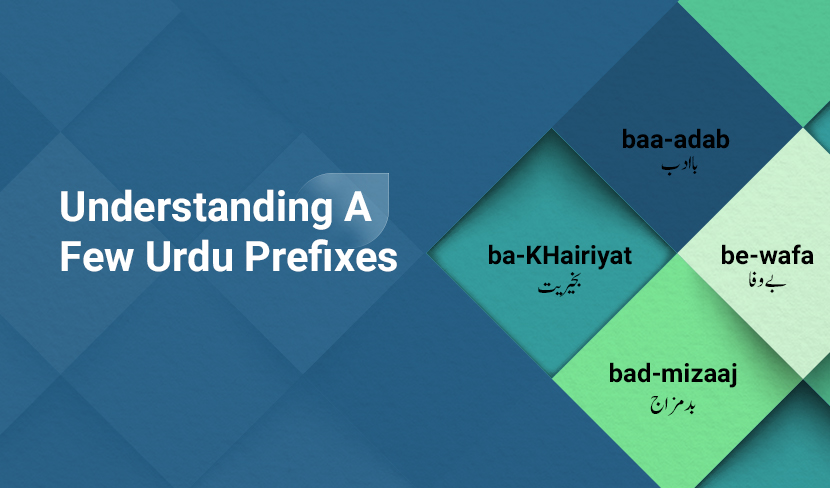زیادہ تلاش کیے گئے الفاظ
محفوظ شدہ الفاظ
کِھسیانی بِلّی کَھمبا نوچے
جسے غصہ آرہا ہو وہ دوسروں پر اپنی جھلاہٹ اتارتا ہے، بے بسی میں آدمی دوسروں پر غصہ اتارتا ہے، شرمندہ شخص دوسروں پر اپنی شرمندگی اتارتا ہے، کمزور کی جھنجھلاہٹ
چَمَنِسْتان
ایسا باغ جہاں پھول کثرت سے ہوں، ایسی جگہ جہاں دور تک پھول ہی پھول اور سبزہ سبزہ نظر آئے، گلزار، گلستان، باغ، پھولوں کا قطعہ، سبز کھیت
Know to Say No in Urdu? Know You Don’t!

During the Victorian times, one unsaid phrase of caution was known by all women alike:
‘You must know how to say no.’
Fast forward to now, it has only become much pregnant with gravity than ever!
Now its meaning doesn’t need to be spelled out; it’s out there, but how about prying into it literally?
Here’s the deal, in this blog we’ll try to pick up the many privative and negating particles that abound in Urdu and figure out how we can say yes by saying no!
Naa
Expressions like Naa-Samajh, Naa-Kaam, Naa-Laaiq, Naa-Aashnaa, etc. are common knowledge.
But Naa can be used in an affirmatory sense, too, like ‘Naa Kaho’ – don’t say, as opposed to ‘Kaho Naa’ – Do say!
Verbal acrobatics apart, ‘Naa’ can also sometimes appear as its short ‘Na’, and be prefixed; for instance ‘Nikamma’!
Interestingly, Naa and Na can affix to a single word and give different meanings! Take ‘Naa-Diida’, which means a blind person who can’t see anything, and ‘Na-Diida’, which means a greedy person who doesn’t see anything (except himself).
Be
Inspired from the Sanskrit privative ‘Vi:’, as in Virodh, Vidhroh, etc., ‘Be’ is commonly used to nullify nouns – ‘Be-Rahm’, ‘Be-Kaar’, ‘Be-Sharm’, and so on.
‘Be’ can also create double-negative words which are quite rare, like ‘Be-Kas’, Kas means somebody/nobody in Persian, so ‘Be-Kas’ literally translates to ‘one without no one’, i.e., forlornly, friendless.
Like Naa and Na, ‘Be’ can also diminish to ‘Bi’ and affix to words, like ‘Bayaabaan’, which is literally ‘Be-Aab-aan’, a place without water, i.e., a desert.
Ghair
In this context, Ghair means ‘other’. Its English equivalent is ‘not’, as in ‘fine/not fine’, similarly, ‘Latif/Ghair-Latif’.
Ghair and Naa can often appear synonymously, as in ‘Ghair-Maujuud’/'Naa-Maujuud’, but can come to yield different meanings, too, as in ‘Naa-Motabar’ – Not credible, and ‘Ghair-Motabar’ – Incredible.
Similarly, ‘Ghair’ and ‘Be’ can sometimes be used interchangeably but in some cases, they can contradict, like ‘Be-Ikhtiyar’ – helpless, and ‘Ghair-Ikhtiyar’ – involuntary.
In principle how these three differ is that the former two predominantly affix to nouns, while the latter conjoins with verbs/adjectives. But again, there’s no fixed rule either!
Laa
An Arabic privative, it appears mostly with Arabic nouns, as in ‘Laa-Waris’ (heirless), Laa-Ta’adaad (innumerable), etc.
But there is one queer word with which ‘Laa’ frequently appears, the Sanskrit-derived ‘Pataa’, forming ‘Laa-Pataa’ – missing, without a sign.
In comparison to the privatives discussed above, ‘Laa’ is also a meaning-intensifier. Like, ‘Be-Haasil’ – of no avail, and ‘Laa-Haasil’ – completely unavailing.
Another interesting comparison is of ‘Be-Jawaab’ – answerless (as in guilty), and ‘Laa-Jawaab’ – speechless (as in exceptional)!
Bilaa
A combination of ‘Ba’ (with) and ‘Laa’ (not), this little particle is much more than a privative, it's a Balaa!
‘Bilaa’ is mostly used in place of ‘without’, as in ‘Bila-TaaKHiir’ (w/o delay), ‘Bila-Shubah’ (w/o doubt), ‘Bilaa-Takalluf’ (w/o hesitation). But there is more to it!
‘Bilaa’ also means ‘beyond’. Take these, ‘Be-Tashbih’ – lacking a simile, and ‘Bilaa-Tashbiih’ – incomparable! Similarly, ‘Be-Ta’beer’ – lacking explanation, versus ‘Bilaa-Ta’beer’ – inexplicable!
Gum
The last of all privatives, and the least privative of all.
Gum is an extraordinary particle; it can negate while not negating at all!
For instance, ‘Gum-Shuda’, means lost, but it also means something else – that that which is ‘Gum-Shuda’, is just not there, but it isn’t like it is not nowhere!
Take the example, ‘Gum-Naam’ as opposed to ‘Be-Naam’, the former means anonymous, but the latter means completely nameless! Meaning the word ‘Gum’ is not negating the name, but is just concealing or rendering it unknown!
In one of my earlier couplets, I used the expression ‘Gum-Misaal’ against the more common ‘Be-Misaal’. Why?
Because, Be-Misaal simply means one without an equal, whereas ‘Gum-Misaal’ means its equal is there, but can’t be traced.
It’s much richer in meaning since the certainty of something not being is less agonizing than the uncertainty of its being.
On that philosophical note, I leave you against this suite of negatives.
Let us know if you know more about no, not because there has not been enough naysaying already, but because there might be more to it!
Forget not, never did nobody not say for no reason, ‘Never say never!’.
Delete 44 saved words?
کیا آپ واقعی ان اندراجات کو حذف کر رہے ہیں؟ انہیں واپس لانا ناممکن ہوگا۔





